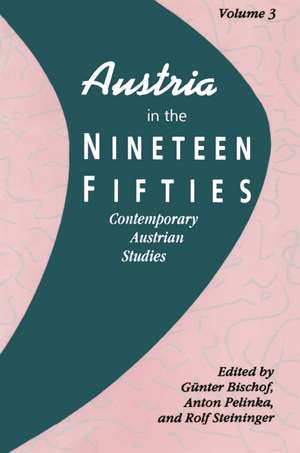Austria in the Nineteen Fifties: Contemporary Austrian Studies
Editat de Gunter Bischofen Limba Engleză Hardback – 18 dec 2020
Preț: 658.14 lei
Preț vechi: 879.80 lei
-25% Nou
Puncte Express: 987
Preț estimativ în valută:
125.93€ • 131.23$ • 104.27£
125.93€ • 131.23$ • 104.27£
Carte tipărită la comandă
Livrare economică 03-17 aprilie
Preluare comenzi: 021 569.72.76
Specificații
ISBN-13: 9781138519060
ISBN-10: 1138519065
Pagini: 318
Dimensiuni: 152 x 229 mm
Greutate: 0.75 kg
Ediția:1
Editura: Taylor & Francis
Colecția Routledge
Seria Contemporary Austrian Studies
Locul publicării:Oxford, United Kingdom
ISBN-10: 1138519065
Pagini: 318
Dimensiuni: 152 x 229 mm
Greutate: 0.75 kg
Ediția:1
Editura: Taylor & Francis
Colecția Routledge
Seria Contemporary Austrian Studies
Locul publicării:Oxford, United Kingdom
Cuprins
Introduction by Gunter Bischof, Topical Essays, U.S. Foreign Policy in the 1950s, The Foreign Relations between the U.S.A. and Austria in the late 1950s, State Treaty and Neutrality: The Austrian Solution in 1955 as a "Model" for Germany?, Between Regulation and Laissez Faire: Austrian State Industries after World War II, The Politics of Productivity and Corporatism: The Late Marshall Plan in Austria, 1950-54, Youth Culture in the 1950s, Nontopical Essays, Hugo Bettauer and the Political Culture of the First Republic, The Roots of Communist Containment: American Food Aid in Austria and Hungary after World War I, 75 Years After: The South Tyrol Conflict Resolved, Historiography Feature, An Incomplete Discipline: Austrian Zeitgeschichte and Recent History, Review Essays, Austrian Menschenjager, Coca-Cola and Pax Americana, French Occupation Policies in Austria after World War II, Book Reviews, Unequal Partners, Der Krieg aus der Luft. Kaernten und Steiermark, and Albrich/Gisinger, Im Bombenkrieg. Tirol und Vorarlberg 1943-1945, Politik in OEsterreich. Die Zweite Republik: Bestand und Wandel, Annual Review, Rainer Nick & Sieghard Viertier, Survey of Austrian Politics 1993
Notă biografică
Günter Bischof is an assistant professor of history and the associate director of the Eisenhower Center at the University of New Orleans. Anton Pelinka is a professor of political science at the University of Innsbruck and also the director of the Institute of Conflict Research in Vienna. Rolf Steininger is a professor of history and the director of the Institute of Contemporary History at the University of Innsbruck.
Descriere
In American history the 1950s are remembered as an affluent and harmonious decade. Not so in Austria. That nation emerged out of World War II with tremendous war-related destruction and with a four-power occupation that would last for ten years until 1955. This volume deals with these larger trends.














